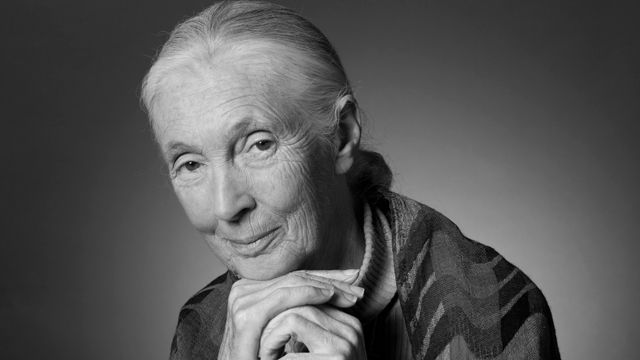Jane Goodall began her landmark study of chimpanzees in 1960, when at the age of 26 she traveled from England to Tanzania to what was then called the Gombe Stream Chimpanzee Reserve. Under the mentorship of anthropologist and paleontologist Dr. Louis Leakey, her discoveries would become the foundation of primatological research and redefine the relationship between humans and animals.
One of Goodall’s most significant findings came in her first year, when she saw chimps stripping leaves off stems to fish termites out of nearby mounds. This and subsequent observations of Gombe chimps making and using tools would force science to rethink the definition that separated man from other animals: “man the toolmaker.”
She defied scientific convention by giving the chimpanzees names instead of numbers and insisted on the validity of her observations that the chimps had distinct personalities, minds and emotions, and lasting family bonds. Through the years, her work also yielded surprising insights, such as the discovery that chimps engage in a primitive kind of warfare.
In 1965, Goodall established the Gombe Stream Research Center, which continues her work today, making it one of the longest uninterrupted wildlife studies in existence.
She also established the Jane Goodall Institute (JGI) in 1977, which supports the Gombe work and other research, education, conservation and development programs. Among these programs are efforts to help local people build sustainable livelihoods while promoting regional conservation goals, and the Institute’s global environmental and humanitarian youth program, Roots & Shoots, which Goodall started with a group of Tanzanian students in 1991 and which today has nearly 150,000 members in more than 120 countries.
Goodall’s scores of honors include the National Geographic Society’s Hubbard Medal, Japan’s prestigious Kyoto Prize, and the Gandhi/King Award for Nonviolence. In 2002, UN Secretary-General Kofi Annan appointed Goodall to serve as a United Nations “Messenger of Peace.” In 2004, Prince Charles invested Goodall as a Dame of the British Empire, the female equivalent of knighthood. In 2006, Goodall received the French Legion of Honor, as well as the UNESCO Gold Medal.

